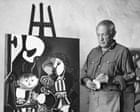What makes a genius? Pushed to define it, we might say it’s a combination of extraordinary talent and drive, often accompanied by a dash of eccentricity or madness. Ultimately, the designation is conferred by hype; it’s essentially an offshoot of celebrity, which is why, as journalist Helen Lewis notes in her new book. “A genius needs a story as well as achievements”. Thomas Edison, Albert Einstein and Pablo Picasso all made pioneering breakthroughs in their respective fields while living unconventional lives that later became the stuff of legend.
Lewis wants us to look at these figures in a more clear-eyed way, and see them as the selfish characters they often were. The lustre of genius, she observes, can provide cover for a multitude of sins: “alcoholism, family abandonment, unfaithfulness, abuse, weirdness, failure to take responsibility”. Since others invariably have to pick up the slack, this amounts to a form of exploitation. Reflecting on Leo Tolstoy’s treatment of his wife, Sophia Tolstaya, over the course of their 48-year marriage, Lewis concludes that the Russian novelist “was a genius, and a parasite”.
The concept of genius presupposes a hierarchy of innate talent, and this comes with baggage, because the science of intelligence testing belongs to the same intellectual tradition that brought us eugenics and so-called scientific racism. Lewis introduces us to some of its notable thinkers, beginning with the Victorian anthropologist Francis Galton, whose 1869 book Hereditary Genius proposed that “greatness” ran in families, and including several of his 20th-century disciples, such as the British social psychologist Hans Eysenck and the US physicist William Shockley. Surveying the lives and works of these men, we notice certain recurring themes: iffy research, a tendency to overlook the importance of structural and material factors in determining success, and an enthusiasm for racial hierarchies.
“Something about the subject of intelligence has a warping effect on its most furious proponents,” writes Lewis, though it’s probably the other way round – the subject seems to attract people who are neurotically fixated with dominance. For such individuals, the idea of genius functions as a self-validating affectation; it “makes a fetish of contrarianism, and flatters the ‘free thinker’ or ‘heterodox intellectual’ into moving from scepticism to conspiracism”. For his admirers among today’s online right, Elon Musk’s gaucheness is only further proof of his smarts.
The book’s central message is that we should refrain from putting people on pedestals just because they happen to be talented. This is sensible, and Lewis’s suggestion that we should apply the term “genius” to specific works, rather than individual people, is persuasive. But the idea that large swathes of the reading public urgently need to be disabused of “the genius myth” is questionable. In one of several sweeping assertions written in the first-person plural, Lewis declares: “We love to contemplate lone rebels, indulge tortured artists and downplay the contributions of those around the genius to paint a more satisfying portrait of superhuman achievement.” Do we? There is an irritating circularity about such pronouncements, whereby the author projects on to the reader the very cliches that underlie her own analysis.
The Genius Myth is one of those popular nonfiction books in which an author sells you the disease in order to sell you the cure. As is customary in this genre, it comes with its own bespoke jargon: Lewis has coined a term – “the deficit model of genius” – to denote the prevalence of certain handicaps or character flaws among extremely talented scientists and artists. A banal truism is thus passed off as sociological insight.
Lewis strives for the easy, conversational style of a Ted Talk, but her attempt at a pally register comes off stilted and ingratiating. The prose is remarkably heavy on italicisation, which lends a rather laboured feel to the exposition – at times, Lewis sounds as if she is trying to convince herself, quite as much as the reader, that something worthwhile is being imparted.
A striking feature of this book is its tone of ambient philistinism, which comes through in a number of revealing asides. Reading Lewis’s kooky capsule summary of James Joyce’s contribution to English literature (“what-if novels, but harder to read”), her high-handed dismissal of “self-conscious precocity and ambition” in film, and her unnecessarily conspiratorial admission that she found Peter Jackson’s Beatles documentary,Get Back, “quite boring”, one can’t help wondering if her misgivings about genius might be a bridge for certain personal hangups about rarefied art, and the people who make it.
Lewis chides Eysenck for his “airy, assured judgments”, but she’s not above emitting some wind of her own. Her contention that Picasso’s womanising provided “an aspirational ideal to lower-status men trapped in bourgeois domesticity and wage slavery”, and that Donald Trump is therefore his “analogue”, is little more than a therapeutic rant. And Lewis surely overstates her point when she says that Picasso is “revered” not in spite of his personal shortcomings, but literally “because of them”. Again, her own viewpoint is projected outwards: since it’s simply inconceivable that people could care that much about the artworks, anyone who admires Picasso must admire him primarily as a shagger, not a painter.
Those credulous Musk fanboys notwithstanding, belief in innate genius – and the special prerogatives afforded to those thought to possess it – is probably less pronounced today than at any point since the 60s. We are increasingly familiar with the stories of brilliant artists who are, or were, terrible human beings, thanks to a slew of articles over recent years, as well as books such asClaire Dederer’s Monsters. With The Genius Myth, Lewis clambers on to a bandwagon that was already starting to creak when, in 2023, the Brooklyn Museum in New York hosteda widely panned exhibitiondedicated to interrogating Picasso’s misogyny. At some point, it will grind to a halt.
The Genius Myth: The Dangerous Allure of Rebels, Monsters and Rule-Breakers is published by Jonathan Cape (£22).To support the Guardian order your copy atguardianbookshop.com. Delivery charges may apply.
